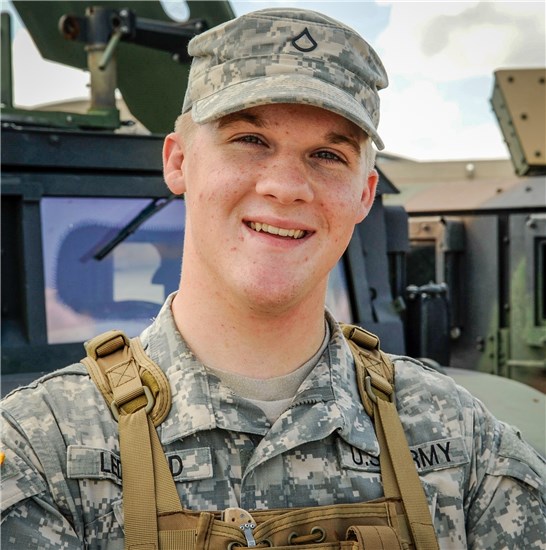 |
| Pfc. Wil Ledford is credited with saving the life of his roommate after an accident in their apartment. Ledford, of Grapevine, Texas, is a newly trained Combat Medic in the 36th Infantry Division of the Texas Army National Guard. (Army National Guard photo by Capt. Mike Perry) |
Story by Maj. Randall Stillinger
GRAPEVINE, Texas – A Texas Army National Guard soldier saved his roommate’s life after the accidental discharge of a weapon in July.
Private 1st Class Wil Ledford, 19, of Grapevine, used skills and techniques that he had just been taught two months prior while attending the Combat Medic School at Fort Sam Houston in San Antonio.
Ledford, a 2013 graduate of Southlake Carroll High School and a member of Headquarters and Headquarters Troop, 3-124th Cavalry Regiment in Wylie, was in his apartment when he heard a gunshot. He went in the next room, saw his roommate looking down at his leg, and asked, “Did you shoot yourself?”
The matter of fact response was a somewhat casual, “Yeah.”
Ledford’s military training instantly kicked in as the hollow point round had penetrated the femoral artery in the left leg and blood came out very fast. He described it as a “garden hose shooting red Kool Aid all over the place.”
He went for his medical aid bag and proceeded to emplace a tourniquet as high as possible on the leg. The first tourniquet did not stop the bleeding so Ledford put on a second tourniquet, which worked.
When asked what he did next, Ledford replied, “I just threw him over my shoulder and carried him to his truck.” He was referring to one of several carrying techniques that are taught to Combat Medics at Advanced Individual Training.
He then drove his roommate to an emergency room, which was less than five minutes away.
It wasn’t until about 20 minutes later that he fully realized what had just happened. “Wow. He shot himself,” Ledford said.
After several surgeries that included skin grafts and the removal of arteries from his other leg, Ledford’s roommate was released from the hospital earlier this month and is expected to be able to walk again in about seven to eight months.
Although he had thought about the possibility of a career in medicine, it wasn’t really a goal. After scoring well on military entrance tests, he was given a few options and thought that “combat medics sounded the best.”
Ledford thought that he might get a chance to use his medical training in his National Guard unit, but never thought that he’d have to use it in his own apartment.
Capt. Matthew Colia, Ledford’s Company Commander, said that his actions are truly extraordinary.
“This situation was one that required decisive action and Private Ledford answered the call of duty,” Colia said.
Ledford, who’s civilian job is a mechanic at a local auto repair shop, said that his “military training and this experience has prompted him to apply for schooling to become a paramedic.”
Private 1st Class Ledford is the son of John and Colleen Ledford of Weatherford, Texas.